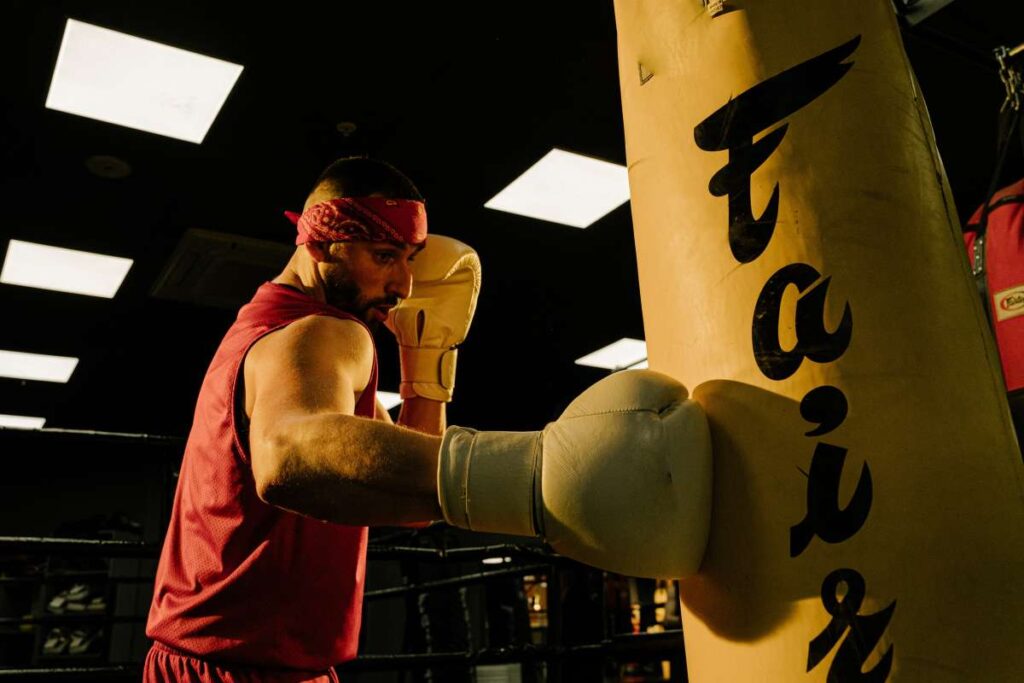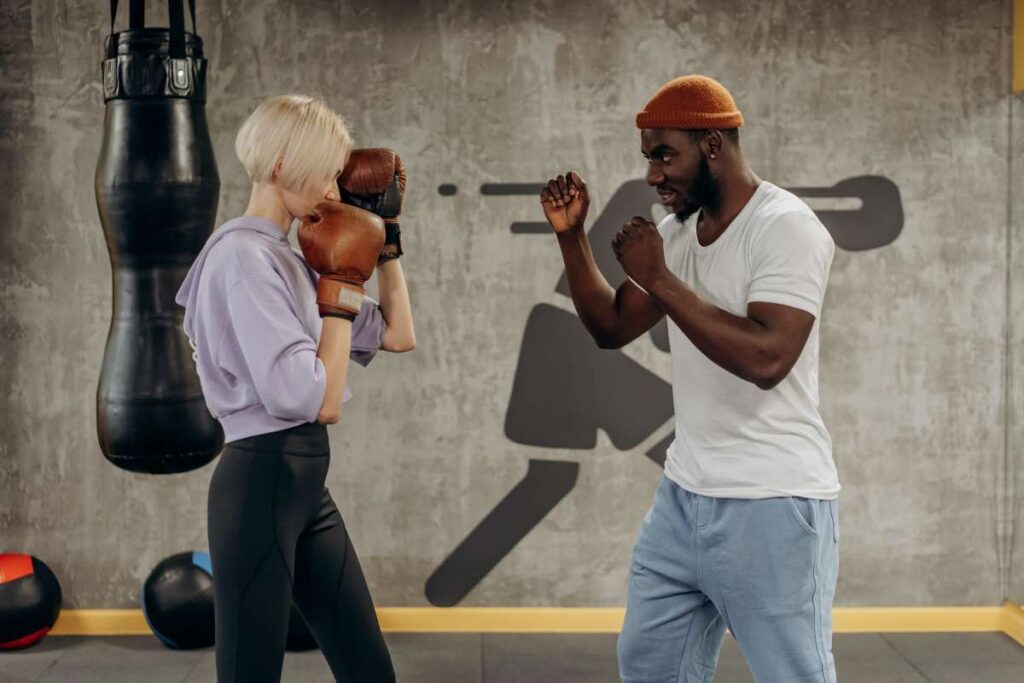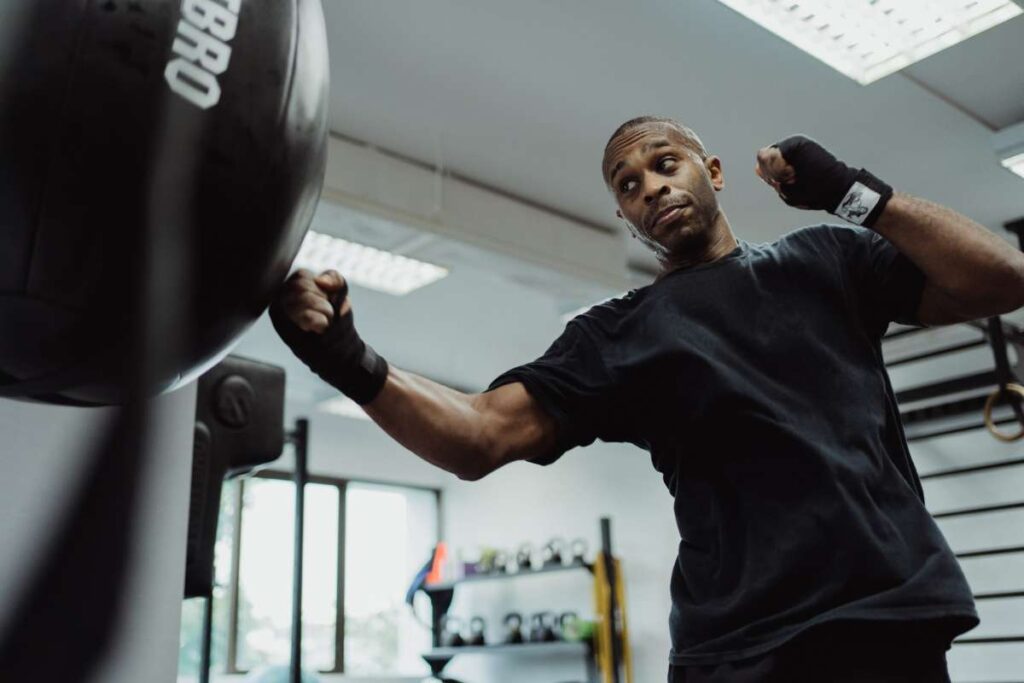You cannot train for English boxing, muay Thai, or savate when hungry. Lack of food prior to a boxing lesson or competition can cause the boxer to lose energy, perform worse, take longer to recover, and increase their risk of injury.
Your body works constantly to recuperate and grow muscle; it doesn't just do this while you exercise. You may therefore provide your body with the nourishment it needs to build muscle, burn fat, and recover as effectively as possible by strategically timing your snacks and meals.
Athletes with exceptional stamina, speed, and endurance are boxers. They can be attributed to their rigorous fitness regimen and training. Boxers have been able to maintain their peak fighting shape, though, thanks to a third factor.
For both amateur and professional boxers, maintaining muscle mass and managing weight loss or gain is essential. They keep a close eye on their nutrition because of this. The good news is that a boxer's diet is not particularly unique and that everyone can follow it because it is part of daily life.
If you've ever taken a boxing class, you know how important it is to fuel your body properly before you start because boxing works your entire body, and you need to be able to keep up! There are, therefore, quick and healthy alternatives that will offer you the energy you need rather than opting for a sugary snack.
Having energy fuel is crucial because boxing burns a lot of calories. Furthermore, consuming the correct nutrients prior to boxing practice will improve your performance. Fuel is food. All athletes, but especially boxers, pay close attention to their food. The secret to maximising performance is eating entire, healthful foods at scheduled mealtimes.
The eating plan that comes after boxing training is beneficial to boxers of all skill levels, whether you're just getting in shape or getting ready to compete. It is essential to adhere to a suitable diet and nutrition plan before a boxing session or entering the ring to make sure your body has the energy it needs.
Boxers who want to compete in this high-intensity, fat-burning sport can meet the demands by using these tips for picking the ideal pre-workout food.
Boxers run early in the morning because running on an empty stomach can help boost the number of calories their body burns during the day. In addition, since most fighters run for weight control and increase their stamina, running in the morning can be highly beneficial.
Boxers should plan a meal around two (2) or three (3) hours before boxing. This gives the body enough time to begin the digestion process. After around 2-3 hours, the energy in the carbohydrates is released, giving boxers increased stamina needed for longer workouts.
Rich in vitamins and minerals, bananas make a great choice of fruit to feed your boxer. They are not only an effective antidote for stomach upset but a fantastic all-around addition to a healthy diet.
Boxers are extreme athletes, and water is their lifeline. Therefore, the importance of water hydration is at the top of the list for athletes. The right amount of water is needed before and after exercise to properly regulate body temperature, lubricate the joints and help your body provide you with vital energy.
Boxers know that the proper post-workout meal will help their bodies recover faster and strengthen their muscles. A huge part of this recovery is providing your muscles with protein so they can repair. Boxers will eat around 25-30 grams of protein within an hour after a fight to kickstart this process.
FAQs
Why Should You Eat Before a Workout in Boxing?
Boxing requires a certain diet when it is frequently practised, just like all combat sports. To reduce weight or gain muscle, you can't only stick to a diet. To develop an ideal, balanced, and healthy diet, you mostly need to modify the foods you eat. Boxers need more nutrients to sustain their training energy, help them gain muscle, and hasten their recovery.
No, we're not advocating that you have a substantial meal right before heading to boxing practice. This wouldn't be the greatest course of action because you'll probably end up feeling tired and uneasy. You must take care to ensure that your body has enough fuel to complete the exercise.
Going without food during a high-intensity workout like boxing might cause muscle loss because so much energy is expended. Therefore, keep that in mind as you prepare to put on the gloves and eat a snack. Before boxing sessions or competitions, insufficient calorie intake could cause energy loss, restricting the boxer's performance and delaying his recuperation.
Constitution Is Important
The structure of the boxer's diet is important. The diet aims to keep muscles strong and healthy while regularly refuelling a boxer's energy stores with carbs and fats. However, because the availability of protein sources like chicken and beef, lean dairy products, and seafood varies, it can be challenging to maintain a constant diet of carbs, protein, and fats. Fruits and vegetables fall under this category as well.
As a result, food supplements are necessary to make up for the lack of nutrition intake. Boxers suggest that periodicals, websites for boxing training, and websites for boxing workouts all provide more information on nutritional supplements.
Be aware that you may take supplements to your diet to make sure your nutritional needs are met. It doesn't imply that you should abandon your boxers diet. The best results from supplements come from combining them with a balanced diet.
For boxers, the recommended diet should:
- Provide you energy throughout the entire workout
- Provide enough nutrients to promote weight and muscular growth.
- Below, digestion doesn't place undue strain on your body.
Carbohydrates must be a priority before training because boxers want to have more energy before their workouts. Typically, a pre-workout meal consists of:
- 50 – 60% Carbohydrates
- 10 – 30% Protein
- 20 – 30% Fat
The diet of a boxer must be modified to meet the needs of their sport. They ought to eat more while limiting their consumption. Managing each meal so that you don't feel hungry while also making sure you don't feel too full afterwards and weary during exercise can be difficult.
Examples of the types of foods in a solid boxing diet plan for boxers include:
Protein
Protein serves as a building block for muscles in the body. The muscles break down while they condition during an exercise with the intention of rebuilding once the workout is over. When training and working out, fit boxers put a lot of strain on their muscles, so protein is crucial to the pre-workout diet. Protein examples include:
- Beans
- Eggs
- Red meats, like beef and pork
- Poultry, like chicken and turkey
- Cheese
Carbohydrates
It takes a lot of energy to exercise. Glycogen (or sugars) reserves that are depleted during exercise are replenished by carbohydrates. Because they contain vitamins and minerals that simple carbohydrates like refined sugars lack, complex carbohydrates give bodies the greatest nutrition. Before boxing, giving the body the appropriate amount of carbs helps maintain stable blood sugar levels so the body can benefit most from the workout. Complex carbohydrates include, for instance:
- Whole grains
- Fruits
- Vegetables
Over time, you'll discover what your body needs, but try to limit snacks to 200–300 calories. You might try the following five quick and simple snack options before your next workout.
Banana
The potassium in bananas, which naturally helps your body maintain nerve and muscle function, is abundant and easily absorbed.
Greek yogurt with fruit
The high-quality protein found in Greek yoghurt helps keep you going long after your workout. By including the fruit, you provide your body with rapid energy to use while exercising.
Apple and peanut butter
A wonderful carbohydrate fuel-up that will keep you running is an apple with a few tablespoons of peanut butter,
Whole grain bread with turkey
A great source of complex carbs that can give you lots of energy is whole-grain bread. For an added protein boost, garnish it with a few slices of lean turkey or hard-boiled eggs.
Cottage cheese and fruit
For a quick source of energy, top a half-cup of cottage cheese with some blueberries or pineapple.
Drink a lot of water both before and after your workout. What to eat next after your boxing workout may be on your mind right now. Your body requires protein to recover from activity. After working out, eating the correct protein gives muscles the amino acids they need for growth and repair. After your next workout, give the following a shot.
- chocolate milk
- protein shake or bar
- low-fat string cheese
- pita and hummus
Great Pre-Workout Combinations
Before boxing, the following food pairings are excellent choices:
- Fruit and nuts with Greek yogurt
- Peanut butter with apple or banana slices
- Whole grain bread with turkey or chicken
- Cottage cheese with fruit
- Pita bread with hummus
Realistically, planning meals when there is such a precisely balanced variety of speciality foods can be challenging. In reality, though, consuming a high-quality protein shake prior to boxing is frequently simpler and equally efficient. To ensure they have enough calories and a balanced diet, most boxing professionals add supplements like protein drinks. A well-balanced protein shake is a great method to provide your body with all it requires swiftly.
During Your Boxing Workout
The only thing you need to worry about during a workout, if it lasts less than an hour, is staying hydrated. A water bottle should always be next to your Liteboxer so you can quickly sip between rounds. Keep an ear out for reminders to routinely consume fluids from our trainers and sip when they do!
Refusing quick-to-eat high-carb foods is crucial when doing high-intensity exercises that take more than an hour, such as a marathon, hike, or back-to-back Liteboxer workouts. Fruit, cereal, or a low-sugar energy bar are a few suggestions.
What To Eat On After A Boxing Workout
You should maintain a healthy metabolism by consuming food that contains both protein and carbohydrates about 30 minutes to an hour after your workout in order to refuel energy and strengthen and repair the muscles that were damaged during the workout.
Before your boxing session, it's crucial to fuel your body with carbohydrates and protein to get you through, but you also need to take care of your body afterwards. After your workout, opt for a high-protein supper that will help your body repair and recover. The sooner you consume it, the better it will be for your body, whether solid or liquid.
Here are some suggestions on what to eat right away following your workout to hasten recovery:
- A protein shake
- Poached eggs on whole-wheat toast
- Sauteed or steamed vegetables
- A bowl of quinoa with pecans and blackberries
- Stir-fried chicken and vegetables over brown rice
- Whole-wheat pasta with chicken, broccoli, and eggplant
- Multi-grain bread with raw peanut butter
- Salad with roasted chickpeas
- Whole-grain cereal or oatmeal, along with milk and fruit
What Not To Eat Before Boxing
While selecting the proper things to eat before a workout may call for careful balancing, the following items should never be consumed before boxing or exercising:
- Drinking milk. It can cause sluggish feelings and reaction times.
- Filling up on junk foods. They don’t provide any real nutrients and can cause harm to your digestive system.
- Eating high-fat foods. Why put extra fat in before the burn?
- Bad, hard-to-digest fats: fast food and other industrial products
- Fast sugars: chocolate, sweets, soft drinks, cakes
- Acidic foods
- Spicy foods
- Alcohol, which promotes dehydration; Some high glycemic index fruits: pineapple, dates, chestnuts, raisins, melon, and watermelon.
How Long Before A Boxing Workout Should I Eat?
Even on recovery days when you aren't training, meals should be planned out according to a boxer's diet plan. Try to adapt your mealtime or training schedule when arranging a workout to leave enough time between when you eat a substantial meal and when you hit the bag.
Boxers should eat their supper two to three hours prior to their match. The body has adequate time to start the digestive process as a result. The energy in the carbohydrates is released after two to three hours, giving boxers the extra stamina they need for longer sessions.
Before You Sweat It Out
Your body burns the same amount of fat before activity whether you eat or not. However, if you consistently exercise without eating first, you could lose muscle because when you're hungry, your body shifts into survival mode and pulls protein from your muscles. Additionally, it would be best if you prevented muscle loss because it might slow down your metabolism and make it more difficult to lose weight.
You should balance your carbohydrate intake with protein before working out. Try eating meals that are low in fat, moderately high in protein, and somewhat high in carbs. Carbohydrates will provide you with the energy you need to keep going during a workout, while protein will assist in muscle growth and repair. So choose simple carbohydrates to digest, and steer clear of foods that are high in fat, fried, or large quantities.
It's important to eat within four hours of exercising and then have a little snack an hour before working out to perfect the timing.
Make sure to hydrate!
It's crucial to hydrate yourself well before and after your workout. According to research, drinking 400 to 600 ml of water before working out makes you more likely to have a better workout and feel like it is easier.
The recommended daily water intake for adult men is 13 cups, whereas for adult women, it is 9 cups. Keep a water bottle at your side as a reminder to consume water throughout the day to help you stay hydrated. In this manner, your body will be prepared to enter the ring when the time comes.
Why Nutrition Is Important in Boxing
Boxing requires maintaining strength and agility while conditioning muscles. A Fitboxer must ensure that they complete the workout and recover in order to train the following day. Eating these foods prior to boxing will support the body before, during, and directly after the workout because good nutrition involves having the proper quantity of nutrients at the right moments for the body's activity.
How Much Should I Eat?
Everyone will see this number differently. However, as a general rule of thumb, you should eat more protein and carbohydrates before and after doing the exercise the more active you are.
Be sure to consult your primary care physician or a dietitian before making any dietary adjustments. They can assist you in creating attainable goals that suit your individual need.
Eat Six Meals a Day
Boxers often stay active all day, with training being the time when they put in the most significant energy demands. Boxers like to consume six moderately sized meals throughout the day rather than three large ones. The lengthy gap between meals, if boxers follow a three-meal routine, is the cause of this change in the food pattern.
In the long run, waiting too long can result in a strong feeling of hunger and lead people to consume more food between meals than they ought to. This might lead to more fat being stored in our bodies. For both normal and boxing athletes, a high quantity of fat is not a good idea; thus, going to six meals each day is a smart move.
Eating two substantial meals right after you wake up and two hours before exercising is advised. The remaining time will be spent eating snacks or meals in between. By eating small meals every two to three hours between large meals, you can ensure you have the energy to make it through the entire training session without getting too hungry.
IN SUMMARY
There is no secret recipe for a healthy pre-or post-workout snack or meal, and it will vary depending on the individual. The true secret is to keep a range of nutrient-dense foods in your fridge and pantry that you love eating, keep you full, and give your body the energy it requires.
When you stock up on whole grains, fruits, vegetables, fibre, healthy fats, and lean protein, you'll have a variety of nutritious options at your disposal when your stomach grumbles that it's time to eat. These foods will help you feel full and satisfied for a longer period of time. Additionally, they have enough strength for your upcoming ring workout!


